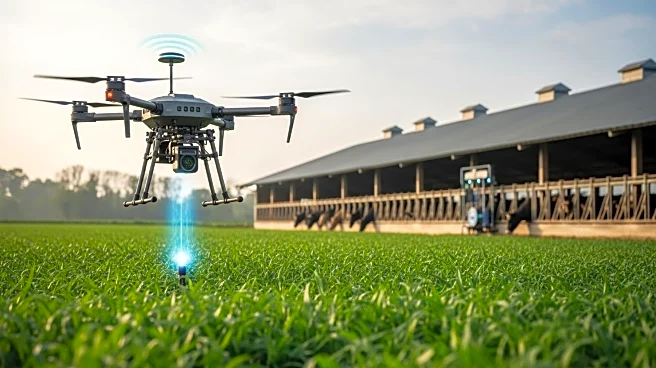What's Happening?
The agriculture industry is increasingly adopting artificial intelligence (AI) to improve crop management and livestock monitoring. Companies like Folio3 and Cropin are at the forefront, offering AI-powered platforms that provide real-time monitoring and data-driven decision-making. These systems utilize deep-learning models to optimize resource distribution and enhance yields. The integration of AI in agriculture is expected to accelerate, with more startups securing funding and corporate pilots transitioning to full-scale deployments. Despite these advancements, the balance between technology and human expertise remains crucial for achieving optimal agricultural outcomes.
Why It's Important?
The integration of AI in agriculture holds significant potential for improving efficiency and productivity in the sector. By providing precise, data-driven insights, AI can help farmers optimize resource use, reduce waste, and increase yields. This technological advancement is particularly important as global food demand rises and climate volatility increases. However, the successful implementation of AI in agriculture requires a careful balance with human expertise to ensure that technology complements traditional farming practices. The potential for mergers and acquisitions in the sector also indicates a growing interest in AI-driven agricultural solutions.
What's Next?
As AI continues to be integrated into agriculture, the industry may see increased collaboration between technology companies and traditional farming operations. This could lead to more comprehensive solutions that address the unique challenges faced by farmers. Additionally, as more startups enter the market and existing companies expand their offerings, competition may drive further innovation and improvements in AI-powered agricultural tools. Policymakers and industry leaders will need to consider the ethical and practical implications of AI in agriculture, ensuring that these technologies are accessible and beneficial to farmers of all sizes.
Beyond the Headlines
The adoption of AI in agriculture raises important ethical and cultural considerations. As technology becomes more prevalent, there is a risk of widening the gap between large-scale operations and smaller, traditional farms. Ensuring equitable access to AI tools and training will be crucial in preventing disparities in agricultural productivity. Additionally, the reliance on AI for decision-making may shift the cultural landscape of farming, as traditional knowledge and practices are supplemented or replaced by data-driven insights. The long-term impact of AI on rural communities and agricultural employment will be important areas for further study and discussion.









